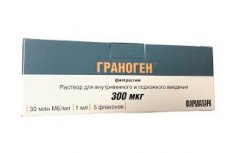該文的醫學專家
新出版物
Granogen
阿列克谢·克里文科,医学审稿人
最近審查:04.07.2025
最近審查:04.07.2025

Granogen(非格司亭)是一种用于刺激体内中性粒细胞(一种白细胞)生成的药物。它是人体正常产生的粒细胞集落刺激因子 (G-CSF) 的合成形式。
非格司亭用于中性粒细胞计数减少的各种临床情况,例如:
- 化疗:化疗后,血液中中性粒细胞水平可能会下降,增加感染风险。非格司亭用于刺激中性粒细胞生成,并缩短免疫系统恢复所需的时间。
- 骨髓移植:接受骨髓移植的患者通常会服用非格司亭来加速术后中性粒细胞水平的恢复。
- 放射治疗:放射治疗后,中性粒细胞也可能减少,可以使用非格司亭来加速其恢复。
该药物通常通过静脉或皮下注射给药。需要注意的是,非格司亭必须按照医生指示并在医生监督下使用,因为使用不当或剂量不当可能导致严重的副作用。
適應症 Granogen
- 预防和治疗中性粒细胞减少症:该药物用于预防和治疗中性粒细胞减少症,即血液中中性粒细胞水平较低的疾病,尤其是在癌症患者化疗或放射治疗期间。
- 加速骨髓移植后的恢复:骨髓移植后,可利用该药加速中性粒细胞水平的恢复。
- 预防感染:在化疗或骨髓移植治疗期间,可以使用Granogen来预防与中性粒细胞水平降低相关的感染的发展。
- 在采集外周血之前刺激中性粒细胞的产生:当常规采集外周血以供随后用于移植时,使用非格司亭可能会刺激中性粒细胞的产生并增加所采集血液中的中性粒细胞数量。
發布表單
Granogen 通常以粉末或注射溶液的形式提供。
藥效學
- 刺激粒细胞生成:非格司亭直接作用于骨髓,刺激粒细胞(例如中性粒细胞)的增殖和分化,从而增加血液中粒细胞的数量。
- 加速中性粒细胞白细胞计数的恢复:在伴有中性粒细胞减少症(血液中中性粒细胞水平降低)的情况下,例如化疗或骨髓移植,非格司亭可促进中性粒细胞水平的快速恢复,并减少白细胞减少并发症的发生时间。
- 增强中性粒细胞的功能活性:非格司亭还可以改善中性粒细胞的功能特性,例如其吞噬和迁移到感染部位的能力。
- 增加中性粒细胞的存活时间:使用非格司亭可以增加中性粒细胞在血液中的存活时间,这也有助于增加其数量和功能活性。
藥代動力學
- 吸收:非格司亭通常皮下或静脉注射。皮下注射后,药物迅速完全吸收至全身出血部位。
- 分布:非格司亭对中性粒细胞表面受体具有高亲和力。它均匀分布于全身所有组织,包括骨髓,并刺激中性粒细胞的生成。
- 代谢:非格司亭在体内代谢,主要在肝脏,但代谢率较低。大多数剂量的药物以原型排出体外。
- 消除:非格司亭主要通过肾脏排出体外。其半衰期较短,这意味着它能迅速从体内排出。
劑量和管理
使用方法:
- Granogen 通常通过静脉内或皮下注射给患者。
- 静脉注射可由诊所或医院的医疗保健专业人员进行。
- 可以根据医生或保健专业人员的指示在家中进行皮下注射。
剂量:
- Granogen 的剂量由医生根据疾病类型、症状严重程度和患者的个人特征决定。
- 通常的起始剂量是每天一次,每次5微克/公斤患者体重。
- 根据治疗反应,医生可能会调整剂量。
治疗时长:
- Granogen 的治疗持续时间也由医生决定,取决于疾病的性质和患者对治疗的反应。
- 治疗可能是短期的(例如,化疗期间)或长期的(例如,慢性中性粒细胞减少症)。
在懷孕期間使用 Granogen
孕期使用Granogen需谨慎,尤其当母亲正在接受癌症化疗时。关于非格司亭在孕期的影响的数据有限,因此通常建议孕妇避免使用。
一项研究发现,接受非格司亭/培非格司亭联合化疗的婴儿与仅接受化疗的婴儿在平均出生年龄、先天性异常或出生体重方面无统计学显著差异。该研究发现,宫内接受非格司亭治疗的婴儿,其出生缺陷或其他长期医疗问题的风险并未增加(Cardonick 等人,2012)。
由于数据有限且存在潜在风险,应在与能够评估使用非格司亭的所有潜在风险和益处的医生仔细讨论后再进行怀孕期间的使用。
禁忌
- 超敏反应:已知对非格司亭或该药物的任何成分超敏反应的人不应使用 Granogen。
- 诊断不明的肿瘤疾病:Granogen 可能刺激肿瘤生长,因此对于诊断不明的肿瘤疾病患者可能禁用。
- 严重粒细胞减少症:患有多发性骨髓瘤或其他类型疾病且血液中粒细胞水平显著下降的患者可能禁用 Granogen。
- 过敏反应:一些患者可能会对非格司亭产生过敏反应,这可能是其进一步使用的禁忌症。
- 怀孕和哺乳:关于在怀孕和哺乳期间使用非格司亭的安全性的信息有限,因此在此期间使用非格司亭应仅在医生的建议下进行。
- 儿科人群:Granogen 对儿童的安全性和有效性可能尚未完全了解,因此在儿童中使用时可能需要咨询医生。
副作用 Granogen
- 骨痛:一些患者在使用非格司亭时可能会出现骨骼或肌肉疼痛。
- 头痛:部分患者使用该药物可能会出现头痛。
- 腹痛:一些患者可能会感到腹部疼痛或不适。
- 肌肉痉挛:非格司亭可能会引起肌肉痉挛或疼痛的肌肉收缩。
- 骨质疏松症:长期使用非格司亭可能会导致骨质疏松症,从而增加骨折的风险。
- 液体潴留:一些患者可能会出现体内液体潴留,导致水肿。
- 体温过高:罕见情况下,患者可能会出现体温升高。
- 过敏反应:极少数情况下,可能会出现皮疹、瘙痒、面部或喉咙肿胀、血管性水肿等过敏反应。
過量
- 骨髓增生性疾病:非格司亭对骨髓的过度刺激可能会导致骨髓增生性疾病,如白血病或骨髓纤维化。
- 白细胞淤滞综合征:在极少数情况下,一些患者可能会出现白细胞淤滞综合征,其特征是血液中白细胞水平极高且被激活,这可能导致血栓栓塞并发症。
- 疼痛症状和肌肉痉挛:一些患者在使用非格司亭后可能会出现疼痛症状,包括肌肉痉挛和骨痛。
- 过敏反应的症状:可能出现荨麻疹、瘙痒、喉咙或面部肿胀、呼吸困难、过敏性休克等过敏反应。
- 急性呼吸道并发症:在极少数情况下,可能会出现急性呼吸衰竭、肺炎或急性肺窘迫综合征等急性呼吸道并发症。
與其他藥物的相互作用
- 影响骨髓的药物:化疗或放射疗法等药物会影响骨髓,这可能会影响 Granogen 的效果。
- 增加中性粒细胞减少症的药物:导致中性粒细胞减少症(中性粒细胞水平低)的药物可能会影响您的身体对非格司亭的反应。
- 影响免疫系统的药物:免疫抑制剂等药物可能会影响免疫系统并与 Granogen 相互作用。
- 影响肾功能的药物:由于非格司亭通过肾脏从体内排出,因此影响肾功能的药物可能会改变其代谢和从体内排出。
- 影响血液系统的药物:抗凝剂等药物可能会与 Granogen 发生相互作用,因为它们会影响血液系统。
注意!
為了簡化對信息的理解,本指令使用了藥物 "Granogen",並根據藥物的醫療用途官方說明。 使用前請閱讀直接用於藥物的註釋。
描述僅供參考,不適用於自我修復指導。 這種藥物的需求,治療方案的目的,藥物的方法和劑量僅由主治醫師確定。 自我藥療對你的健康有危害。


